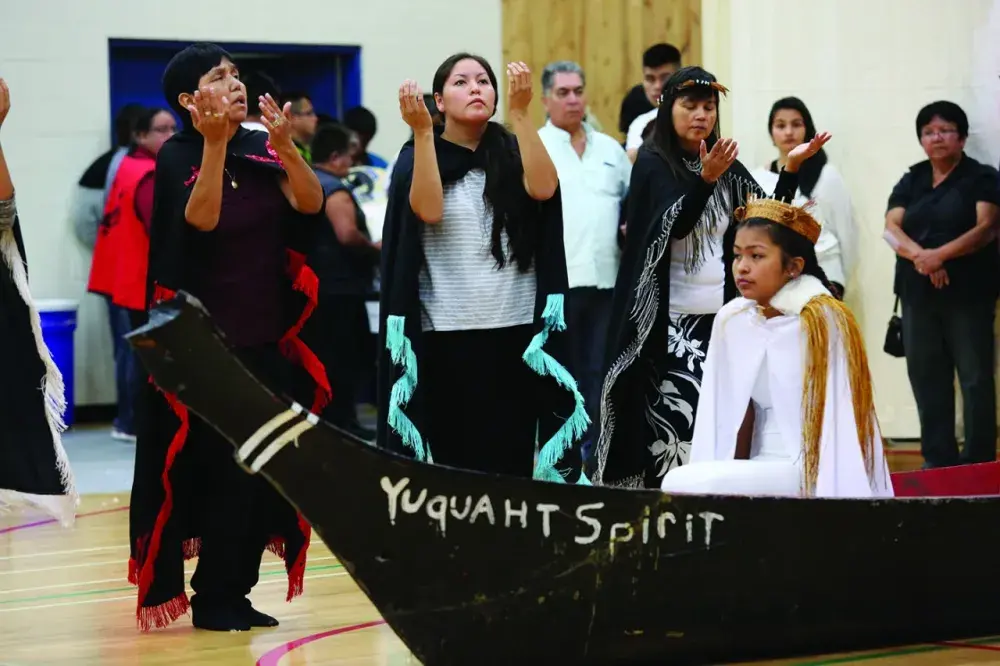Various cultural revivals of First Nations traditions are taking place right across Canada now. Part of this movement within Nuu-chah-nulth communities is teaching youth about sexual and reproductive health. The topic can be taboo, and is often awkward for young people who going through their own formative changes, but NTC nurses, elders and even school staff feel a shift in focus would help in the delivery.
“This is a new initiative that’s being done by the three departments: NTC Child and Youth, NTC Nursing, and NTC Education,” said Jeannette Watts, the tribal council’s nursing manager. “We’re building on the cultural strengths in the area that sustained our populations forever.”
“And there’s barriers to that today, but we’re trying to break that down and bring back the beautiful traditional ways of supporting young people with their sexuality,” she added.
Watt’s believes this is an important step, and traditions like coming of age ceremonies are happening more and more already. But she says because the push is so new for them, the NTC departments are open to a lot of feedback from community members, and openly asking for it. While Watts is the nurse manager, it was community health nurse Kathleen Harris who first came up with the idea to incorporate traditions into classroom sexual education teachings. Harris was a guest at a coming of age ceremony last year, which is where she got her inspiration.
“My role in NTC is community health nurse, and part of that role is going into the schools and doing the sexual health teachings,” said Harris. “I had the honor of attending a traditional coming of age ceremony with another nation, and was very impressed with how those teachings used a strength-based approach, and really focused on respect for our bodies and respect for women as givers of life.”
Those teachings could help to counteract some of what’s actually been termed “rape culture,” she added, noting that isn’t her choice of terminology necessarily, but it is used by the local women’s centre. Harris also teaches at the University of Victoria, and even there, there’s a major concern with how young people conduct themselves sexually, particularly around consensual and non-consensual sex, she said.
Harris has been chatting with various people in the community since attending that ceremony, getting their take on what she is proposing. In her conversations, she has been fully supported by those she’s spoken with, and she’s also gained a bit more direction on it. Her fellow nurse co-worker, Francine Gascoyne, has been in on it, too.
“I have also talked to the principal at Ditidaht about having a couple of student reps from the school, and having them recognized as knowledge holders, being able to contribute valuable information from the student perspective,” said Harris. “We want to get student input as to what they want to be hearing about.”
Harris is careful to note that she is First Nations, but not Nuu-chah-nulth, so she won’t be teaching any of the traditional knowledge and she won’t be deciding what’s important. It will be a collective effort from the community, and this is where elders and knowledge holders in the community will come in.
Julia Lucas is one of these people. Harris will be consulting with her going forward as the school sexual health curriculum is made. Lucas is an elder at the Friendship Center in Port Alberni. She works in the language nest program, talking with babies in Nuu-chah-nulth, and she works with the children in daycare, as well. Her sister does this work with her.
Lucas is onboard with the nurse’s decisions, and is particularly interested in having the coming of age ceremonies practiced more regularly, she said.
“It’s coming back quite strong. It was dormant for many years,” said Lucas. “When my second son had his daughter, I talked to him about how important his daughter is, and said this is what you have to do, is show the people how much she means to you. What the ceremony is about is that no one is in any way to abuse her.”
Lucas says with the ceremony for young girls, four men are appointed to be the girl’s guardians as she goes through her teenage years. The ceremony ultimately teaches the young woman she is valued, and truly loved by her family. Lucas couldn’t comment on the details of ceremonies for boys, because being female, she just hasn’t been around them enough, but she believes the effect is the same—the boys, too, are taught they have value to family and fellow community members. This really encourages them to maintain good behaviour, too, because the respect that is given to them, is something they want to keep.
The other piece of what the ceremonies do, is teach sexual health from a significantly more positive perspective than what came in with the colonial mindset. And for young girls, in particular, this is true.
“There’s no shame in it. You’d be dead if you didn’t get your menstruation period...You’d be dead or pregnant,” said Lucas, with a laugh.
For more information, or to share your thoughts with the NTC nurses, contact Kathleen Harris at the NTC office: 250-724-5757.







